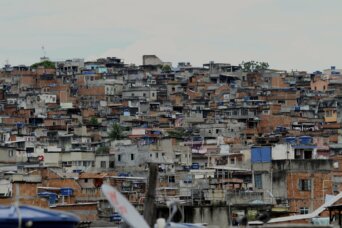- About
- Topics
- Story
- In-Depth
- Picks
- Opinion
- News
- Donate
- Signup for our newsletterOur Editors' Best Picks.Send
Read, Debate: Engage.
| topic: | Racism |
|---|---|
| located: | Brazil, Colombia, USA |
| editor: | Ellen Nemitz |
The Oscar winning short film of 2021, Two Distant Strangers, may seem like a simple time dystopia: a man is being killed by the same person every day, and wakes up one more time just to die again and again, no matter what he does, no matter what he says. In real life, though, the character represents every single black person killed by the police in a variety of situations everyday. They do not wake up the next morning.
Recently, the policeman responsible for the murder of George Floyd was convicted. The verdict has raised celebrations, as well as some criticism, but also the question: what about the other victims of excessive force who had their lives abbreviated because of hate? Not only black ones: also the poor, women, LGBTI people, or those fighting for their rights, for better living conditions, for the environment. Amplifying these stories is the only way to stop the cycle of violence.
The epidemic of violent, senseless murders extends far beyond the US.
Last week, a massacre took place in the Jacarezinho community, a Brazilian slum. In the name of the war on drugs, at least 28 people were killed. After one of the deadliest massacres in Brazilian history, part of the population clamoured for justice, while others just saw the operation as a necessity to fight crime - forgetting that even criminals deserve a fair trial and that there is no death penalty in Brazil.
Meanwhile, this endless war has victimised several innocent people so far. And crime goes on.
Responding to the Jacarezinho massacre, which soon gained global attention, international organisations such as Amnesty International and the United Nations have called for independent investigations of the reported “atrocities”.
Public figures have also expressed rejection of the violence, both within and outside of Brazil. Professor Carl Hart, a psychology professor at Columbia University, used hashtags in Portuguese like #ChacinaDoJacarezinho and #ForaBolsonaroGenocida in a series of Tweets about how Brazil carries on the "the largest Black population [extermination] outside Africa.”
Also last week, Colombia saw a huge attack on civil rights. As the population’s protests against a proposed tax reform continued even after the government stepped back on its plans, the violence has risen. According to the Colombian NGO Temblores, at least 39 people were killed by the police. In addition, another 1876 cases of violence have been reported, including gun shots, eye injury and sexual violence.
These violently repressed demonstrations are not isolated, though. Throughout America, the freedom to express opinions and protest for popular ideas and rights has frequently come under attack. Chile, El Salvador, Puerto Rico, Mexico, Cuba, Guatemala, Peru are just some examples of how violence has been used as a response to social problems.
The greatness and importance of the film Two Distant Strangers is to call attention to a phenomenon people would not truly understand otherwise. After all, the deaths of so many people worldwide became part of the routine - and as they are often far away from our lives and families, they receive only a few minutes of attention during news reading.
This situation could, however, be possibly changed through artistic productions, such as this film, that convey to us the feeling of being trapped in an endless war.
Image: Antônio Carlos Costa.

